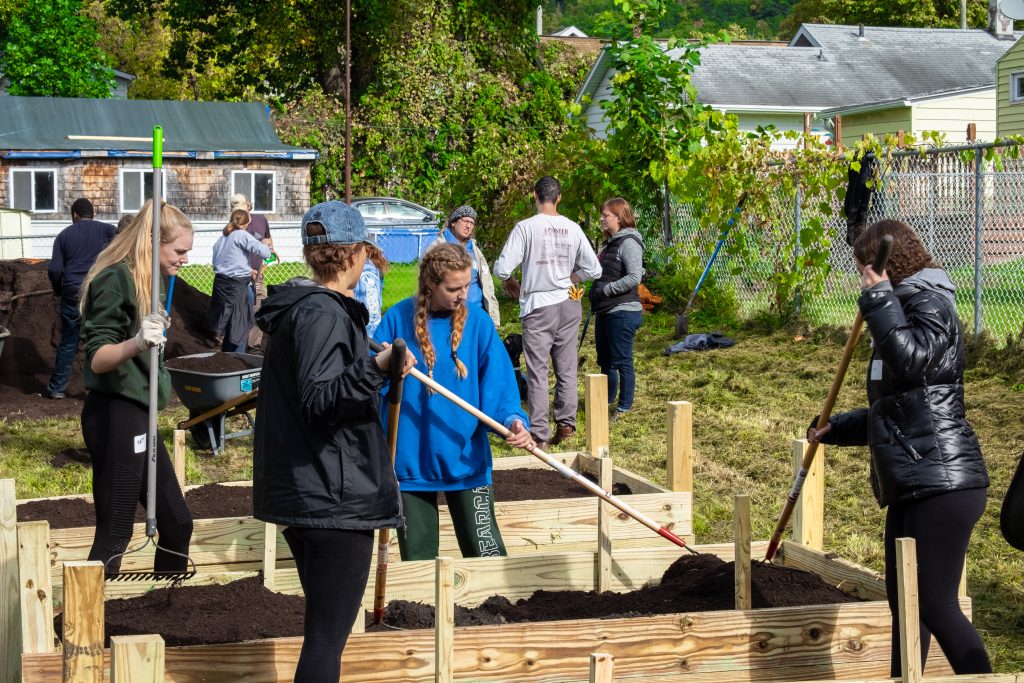The Harpur Edge office annually provides four students with funding to design and conduct a community service project of their choice, anywhere in the world. This year, Georgia Kerkezis, a junior majoring in environmental studies, was selected as one of the 2018 Harpur Fellows and is focusing her community service efforts locally.
For her project, Kerkezis is working to build garden beds on Binghamton’s East Side. The community garden beds will be available for people to rent, and Kerkezis hopes to use them to help fight food insecurity and poverty in the area.
Kerkezis learned of the Harpur Fellows program last spring and was immediately interested in being involved. As a member of the Public Learning Service Community for the past two years, Kerkezis said she knew she wanted to focus her efforts in the Binghamton area.
“I was super interested in proposing a service project, but I wasn’t quite sure what to do,” Kerkezis said. “The last thing I wanted to do with my project was go halfway across the world to a community and wrongly assume I knew what it needed. In Binghamton, I felt like I had a better understanding of the community needs because we’ve learned about them in many of my classes.”
The project is a partnership between Kerkezis and Volunteers Improving Neighborhood Environments (VINES), a local nonprofit organization. Kerkezis said she chose to work with VINES after she spoke with community members to discuss her idea.
“We discussed the food insecurity and poverty that exists in Binghamton and ways to alleviate it,” Kerkezis said. “Though VINES has already constructed community gardens elsewhere in Binghamton, none have been built on the East Side yet. Further, of all the community gardens already built, there are only about eight wheelchair-accessible garden beds which sell out really quickly each year.”
Kerkezis spent last spring organizing her proposal to Harpur Edge and VINES, which included planning a budget and sketching site designs. After the project was approved, she stayed in Binghamton for the summer and conducted community outreach, recruiting volunteers and gathering contact information for residents interested in renting garden beds.
“I went door-to-door and spoke with residents about the project, explaining what it was and making sure they wanted the garden to be built in their neighborhood,” Kerkezis said. “We recruited volunteers by reaching out to University students and community members. This past Saturday, the volunteers helped us build 10 raised garden beds made of wood and filled with soil and compost.”
The project will be completed within the coming weeks. A concrete pad will be poured at the site and the remaining six garden beds will be installed on top of that, making them wheelchair accessible. The garden beds will be available for rent beginning this spring.
Wendy Neuberger, director of Harpur Edge and head of the panel that selects the recipients of the Harpur Fellowship, said Kerkezis delivered an impressive presentation that won the committee over.
“It was clear from [Kerkezis’] application and interview that she possessed the qualities that the fellowship is designed to recognize, including passion, imagination, self-reliance and perseverance, as well as academic achievement and potential,” Neuberger said.
Students can apply for the Harpur Fellows program in February for the following summer. An application must include an essay detailing the project, the plan and timeline, as well as a proposed budget. Applicants must also submit a letter of reference and an updated résumé to be considered. Once applications have been submitted, there is a round of interviews to determine who will receive the fellowship grant, which provides up to $4,000 in funding for selected projects.
Kerkezis said she hopes her project will have a lasting impact, bringing the community closer together and alleviating food insecurity in the area.
“The community garden will offer residents access to local, nutritious food, as well as combat food insecurity and poverty,” Kerkezis said. “It will support a stronger local food system that is environmentally sustainable and just. Long after I graduate, I hope the garden remains an integral part in the lives of East Side residents.”
Editor’s note: Georgia Kerkezis is a columnist for Pipe Dream’s Opinions Section.



